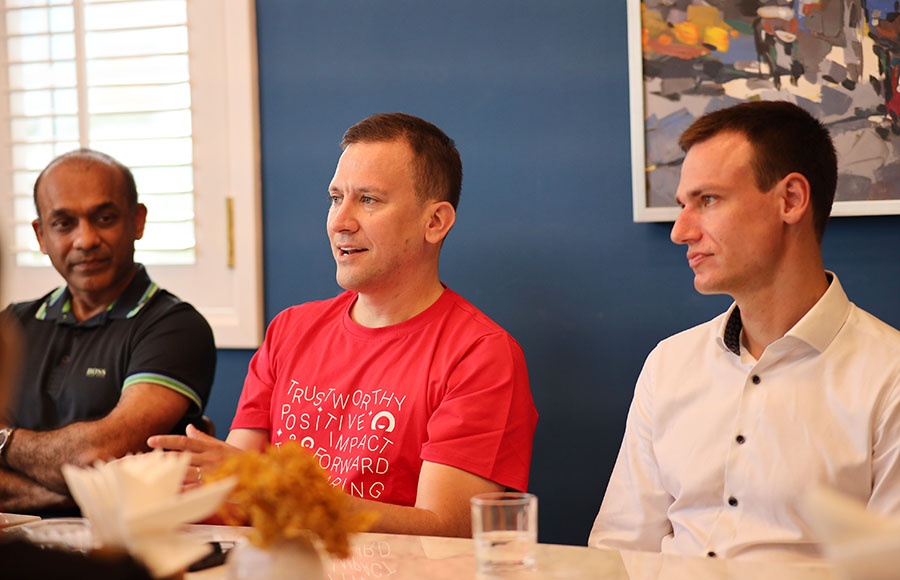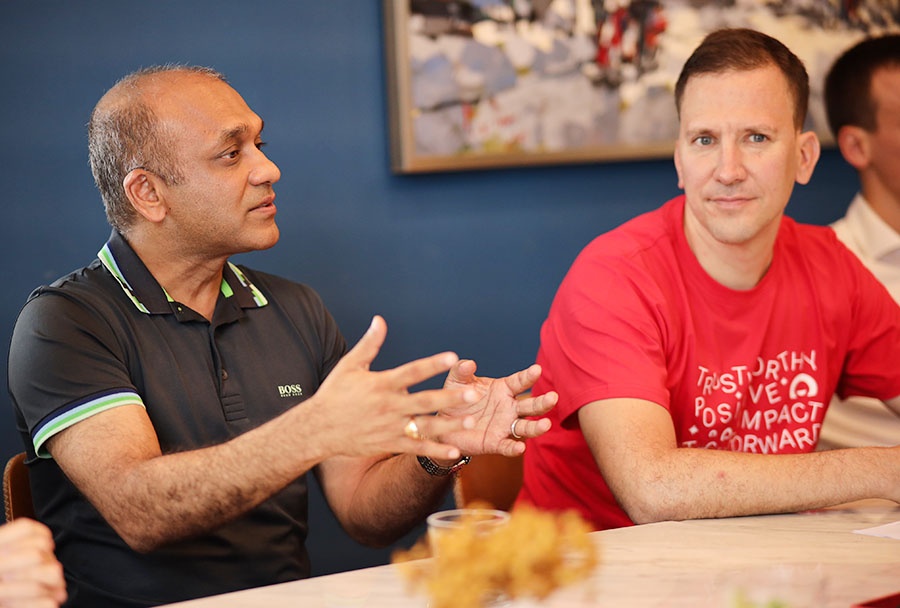Home Credit: Thinking differently about financial literacy
Jan Ruzicka, Home Credit’s chief external affairs officer, used to travel to Vietnam every month to share the group’s know-how, experience, and case studies. Social distancing and the pandemic caused a pause in his travelling schedule, but he has now returned to Vietnam.
Ruzicka has brought with him Dr. Sumit Agarwal, Professor of Finance, Economics, and Real Estate at the National University of Singapore, to develop new ways to implement financial literacy in Vietnam.
Digitalisation – a risky gift
“Financial literacy projects are our signature all around the world and we have been conducting them for more than 20 years. Things were offline when we began and we had to print textbooks and send volunteers to rural areas to educate children and farmers who were not familiar with financial services,” Ruzicka recalled.
Digitalisation marks a change in financial services with things moving online.
“Digitalisation is a gift, but it also makes those who are not financially savvy vulnerable to fraudsters,” said Ruzicka.
A quick Google search reveals many cases of phishing aimed at victims with little financial knowledge.
“We believe that it is important to give credit to mass market customers, but at the same time, we need to educate them so that they will not fall into online traps. It is our task to protect customers and to provide them with know-how and credible, safe services,” Ruzicka stated.
 |
| “We are long-term players, and we do not believe that shortcuts work,” said Jan Ruzicka, chief external affairs officer at Home Credit |
Financial literacy – a means for customer protection
At first, Home Credit’s perspective on financial literacy puzzled Agarwal.
“As an economist, I was puzzled when I first learnt that Home Credit – a private consumer finance company – wanted to educate its consumers. Most finance companies think about how to maximise returns rather than educating consumers. But after working with them, I realised that they really wanted to educate,” Agarwal said.
Agarwal has a passion for protecting consumers and has found a common cause with Home Credit, leading to his decision to partner with the company in developing content to educate a wide array of consumers.
“I believe in household sustainability in which each household should be sustainable from an environmental, social, and financial point of view. We cannot achieve environmental sustainability unless we have financial sustainability. Access to credit is key to both household financial sustainability and a country's economic sustainability,” Dr. Agarwal emphasised.
 |
| Home Credit is delivering financial literacy content to one million consumers each month via their mobile app |
Financial inclusion for the unserved
Vietnam’s financial banking situation is very similar to other Asian countries such as China, the Philippines, Indonesia, and India. Traditional banks have a tendency to serve citizens in big cities and neglect those in the countryside. However, digitalisation and fintech banking have brought financial services to the masses, including those in mountainous and rural areas.
According to Agarwal, surveys suggest that around 70 per cent of Vietnamese citizens are financially illiterate.
“Financial literacy should be coupled with digital literacy when most consumers are dealing with finance digitally. There is a lot of fraud and manipulation by third parties who realise that many financially illiterate people are trying to access finance digitally, and they are most likely to get it wrong,” commented Agarwal.
This is also where the story of Home Credit’s financial literacy starts.
“We focus on farmers, women, vulnerable people, and children to help them understand the basic ideas of money, finance, and responsibility. We deliver information to our customers both online and offline because some people are still not confident with digital communications,” said Ruzicka.
Every year, Home Credit’s financial literacy courses reach more than 100 million people. In Vietnam, about half of the company’s marketing budget is spent on financial literacy. Home Credit Vietnam welcomes 300,000 new customers onboard each month, yet its non-performing loans always remain under 3 per cent, and in some circumstances even under 2 per cent.
Brand health checks indicate that customers’ level of satisfaction with the company’s products stands at 65-75 per cent – a relatively high score compared to the overall industry. These figures are evidence that Home Credit Vietnam’s financial literacy efforts have paid off.
A responsible grandma
In the world of fintech banking, with new and young brands always launching, Home Credit is seen as a grandma with more than two decades of experience. Ruzicka used to get laughed at for his grandma-style conservativeness when talking to business leaders in China, the Philippines, and elsewhere. This conservative attitude meant that the company survived the economic crisis when others did not.
“With regard to financial literacy, environmental, social, and governance, and business, we are long-term players and long-term believers. We do not believe that shortcuts work,” emphasised Ruzicka.
In Vietnam, Home Credit’s financial literacy includes measuring the effectiveness of its activities.
“We carry out a survey with customers on their journey, seeing how the customer responds to financial literacy and offering more suitable options based on their feedback,” said Ruzicka.
“I do not know of any other financial companies around the world that actually measure their financial literacy programmes, how customers are benefiting, and how social welfare is improving,” commented Agarwal.
“This job is done not by corporations but by governments. But even governments do not track it sufficiently,” he added.
 |
| “Access to credit is key to household financial sustainability and a country's economic sustainability,” highlighted Dr. Sumit Agarwal, Professor of Finance, Economics and Real Estate, National University of Singapore |
Home Credit entered the Vietnamese market in 2008 – one of the first companies specialising in consumer finance to do so. The company has always pursued the goal of sustainable development. It has been working with the State Bank of Vietnam, the Vietnam Women’s Union, and the Ministry of Finance to expand its financial literacy programme in Vietnam – a critical market for Home Credit.
 | Home Credit publishes its 2021 Sustainability Report Home Credit on June 30 released its Sustainability Report 2021, detailing the company’s progress in delivering on environmental, social, and governance (ESG) principles, such as by promoting financial inclusion and offering responsible products and services to underserved populations. |
 | Home Credit partners with Tiki to launch Home PayLater Home Credit announced on July 15 that the company has signed a cooperation agreement with Tiki – one of Vietnam’s top e-commerce platforms – to launch Home PayLater, a Buy Now Pay Later product. |
 | Home Credit invests VND200 billion into Buy Now Pay Later service Home PayLater – a digital financial product with a VND200 billion ($8.7 million) investment – is set to enhance the convenience of consumers’ online shopping experiences. |
What the stars mean:
★ Poor ★ ★ Promising ★★★ Good ★★★★ Very good ★★★★★ Exceptional
Related Contents
Latest News
More News
- Private capital funds as cornerstone of IFC plans (February 20, 2026 | 14:38)
- Priorities for building credibility and momentum within Vietnamese IFCs (February 20, 2026 | 14:29)
- How Hong Kong can bridge critical financial centre gaps (February 20, 2026 | 14:22)
- All global experiences useful for Vietnam’s international financial hub (February 20, 2026 | 14:16)
- Raised ties reaffirm strategic trust (February 20, 2026 | 14:06)
- Sustained growth can translate into income gains (February 19, 2026 | 18:55)
- The vision to maintain a stable monetary policy (February 19, 2026 | 08:50)
- Banking sector faces data governance hurdles in AI transition (February 19, 2026 | 08:00)
- AI leading to shift in banking roles (February 18, 2026 | 19:54)
- Digital banking enters season of transformation (February 16, 2026 | 09:00)

 Tag:
Tag:




















 Mobile Version
Mobile Version